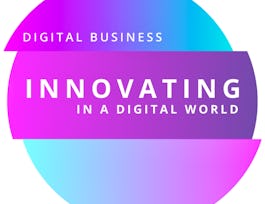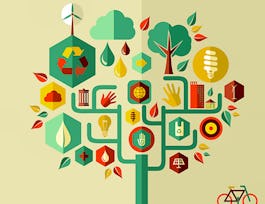We can no longer ignore humans’ negative impact on the planet. While some parts of the world still can close their eyes to shared and global sustainability challenges, the negative consequences of human activity in other parts of the world have increasingly detrimental effects on the planet and people’s lives. For example, in recent years, global warming is leading to heavy rainfall at unusual times of the year. As a result, in India, some farmers have lost their entire cotton harvest. We also begin to see and understand the negative impacts of global plastic use and waste on nature, animals, and the things we eat.


Business Models For Sustainability
Taught in English
Some content may not be translated
5,201 already enrolled
Course
Gain insight into a topic and learn the fundamentals



Instructors: Esben Rahbek Gjerdrum Pedersen
(24 reviews)
What you'll learn
Sustainable business model theory
Sustainable business model innovation
Tools and strategies for sustainable business model innovation
Details to know

Add to your LinkedIn profile
7 quizzes
See how employees at top companies are mastering in-demand skills


Earn a career certificate
Add this credential to your LinkedIn profile, resume, or CV
Share it on social media and in your performance review

There are 7 modules in this course
Over the last two decades, it has become increasingly clear that our current ways of living and organizing are neither environmentally nor socially sustainable. Research shows that current climate changes and dramatic decreases in global biodiversity are a direct result of human activity. Sustainability challenges take many forms. To give an example, research increasingly points to the negative consequences of our global love for plastic. Arguably, plastic has many amazing properties, including being recyclable. However, research also increasingly points to plastic’s detrimental effects on the planet and people—for example, through microplastics ending up in the oceans and then in the fish and seafood that we eat. Some problems that we face with social sustainably are a direct consequence of business activities—for example, exploitation of people in global supply chains in the form of unsafe working conditions or less-than-minimum-wage pay. Exploitation can also take the form of child labor, which continues to be a problem. Social sustainability challenges also arise as a result of global warming, with people already living in precarious conditions often carrying the biggest cost—for example, losing an entire cotton harvest due to heavy rain. In this module, we will begin to see how companies are part of the problem but also part of the solution to the sustainability crisis that the world is facing. Companies can play an all-important role in changing current unsustainable practices through innovative and sustainable products, services, and business models. In this module, we will briefly introduce you to some central problems related to our current ways of running businesses. We will introduce you to the concept of business models and discuss how a sustainable business model is different from what we might think of as a conventional or linear business model. Finally, you will also get to meet the CEO and CMO of the B-Corp Too Good To Go, who will share their experiences setting up a company with a mission of fighting food waste.
What's included
6 videos2 readings1 quiz2 discussion prompts
Building on the concept of sustainable business models introduced in Module 1, we will explore what innovation is and its benefits in this module. If we are to change towards more sustainable organisational practices, it is paramount that we innovate on products and services and the way we run businesses. You will learn about sustainable business model innovation, key principles of sustainable business model innovation, market evolution and the role of consumers, and various tools to develop sustainable business models. We will exemplify the various aspects of sustainable business model innovation through a number of industry and business examples, such as Mobility, Fairphone, and Interface, while discussing their approaches to sustainability. We will also introduce you to the Danish print company KLS Pure Print. You will learn about KLS Pure Print’s journey from an old-school, traditional print business to becoming a front-runner in sustainable printing. Because of this shift, the company is still in business. Finally, we will also take a closer look at social innovation with Professor David Murillo from ESADE through a careful analysis of the UK-based Behavioral Insights Team (BIT).
What's included
8 videos3 readings1 quiz1 discussion prompt
In this module, Lars Jacob and Svening will take us on a deep dive into the concept of the circular economy. Through a number of examples from various industries, they will discuss the main differences between linear and circular economies, and they will explore some key characteristics of circular business models. Starting with a circular economy, they will introduce concepts such as the access and collaborative economy, the all-important role of collaboration and partnerships for sustainable futures, as well as different levels of “recycling.” In this module, you will also have the chance to meet some of the brave front-runners of circular business models, like the Dutch jeans brand MUD Jeans, the French online marketplace for carpooling BlaBlaCar, and the Danish children’s clothing library Vigga.
What's included
7 videos2 readings1 quiz1 discussion prompt
In this module, we will further explore concepts introduced in this course’s previous modules. Our main focus will be on how companies work with sustainability in practice and what challenges and opportunities they face in doing so. First, Professor Esben Rahbek Gjerdrum Pedersen will introduce the concept of strategic planning and implementation and the relationship between a strategy and a business model. We will then continue by exploring how companies work with value propositions, customer interfaces, supply chains, and financial models in reality. Finally, we will look into sustainable communication and marketing and what role they play in transforming companies towards sustainability.
What's included
6 videos2 readings1 quiz1 discussion prompt
In this module, we will investigate and discuss the business models of three companies, namely the sports brand PUMA, the water company Aarhus Vand, and the dairy company Thise. Representatives from each company will share with us their company strategies, ideas, struggles, and rewards from investing in sustainable business model innovation. Following each case video, we will discuss their approaches to sustainable business model innovation, drawing on the concepts and ideas introduced in earlier modules while also encouraging you to ask critical questions about the pros and cons of the chosen approaches.
What's included
6 videos2 readings2 quizzes1 discussion prompt
In this last module, we will move the discussion of sustainable business model innovation from individual businesses to ecosystems. As seen in previous modules, some challenges that businesses face in their sustainability work are systemic and therefore also very hard for an individual company to solve. We see an urgent need for entire ecosystems to change to also allow individual companies to transform their business models. In the last couple of decades, we have seen an increasing number of attempts at creating systemic change towards sustainability. Often, these attempts take the form of movements, guided by a form of a manifesto. The United Nations Sustainable Development Goals (SDGs) are one such example of a manifesto trying to facilitate system change. As we will see in this module, all of these movements for systemic change have collaboration or partnerships for sustainability at their heart. You will meet representatives from three movements, all aiming to create more sustainable alternative ecosystems. First, you will meet representatives from the B Corp Movement who will share with us how it approaches a sustainable business model and system innovation. Second, you will meet Claus Meyer, who is one of the founders of the New Nordic Cuisine (NNC). The NNC continues to have a great impact on the Nordic food culture, arguably also beyond the Nordic countries, towards more local and sustainable value chains and healthy diets. Third, we will also discuss the all-important role of sustainable investment in transforming our societies towards sustainability. Finally, we will have a critical discussion with Professor Esben Rahbek Gjerdrum Pedersen on the challenges and opportunities companies face when investing in sustainable business model innovation, both at a company and system level. In creating this course, we have had the honor of meeting incredible people working hard to transform how we do business. We have learned so much on this journey, and we hope you have, too—not least in this last module, where we take a closer look at much-needed systemic change.
What's included
13 videos2 readings1 quiz1 discussion prompt
In this final assignment, you must take the skills you have learned to use in a case study and business model analysis of a company of your choice. This may be a brand, a manufacturer, a service provider, or another organisation that you find relevant and interesting to investigate.
What's included
1 peer review
Instructors



Recommended if you're interested in Business Strategy

University of Colorado Boulder

Institut Mines-Télécom
Why people choose Coursera for their career




Learner reviews
Showing 3 of 24
24 reviews
- 5 stars
83.33%
- 4 stars
12.50%
- 3 stars
0%
- 2 stars
0%
- 1 star
4.16%
New to Business Strategy? Start here.

Open new doors with Coursera Plus
Unlimited access to 7,000+ world-class courses, hands-on projects, and job-ready certificate programs - all included in your subscription
Advance your career with an online degree
Earn a degree from world-class universities - 100% online
Join over 3,400 global companies that choose Coursera for Business
Upskill your employees to excel in the digital economy
Frequently asked questions
Access to lectures and assignments depends on your type of enrollment. If you take a course in audit mode, you will be able to see most course materials for free. To access graded assignments and to earn a Certificate, you will need to purchase the Certificate experience, during or after your audit. If you don't see the audit option:
The course may not offer an audit option. You can try a Free Trial instead, or apply for Financial Aid.
The course may offer 'Full Course, No Certificate' instead. This option lets you see all course materials, submit required assessments, and get a final grade. This also means that you will not be able to purchase a Certificate experience.
When you purchase a Certificate you get access to all course materials, including graded assignments. Upon completing the course, your electronic Certificate will be added to your Accomplishments page - from there, you can print your Certificate or add it to your LinkedIn profile. If you only want to read and view the course content, you can audit the course for free.
You will be eligible for a full refund until two weeks after your payment date, or (for courses that have just launched) until two weeks after the first session of the course begins, whichever is later. You cannot receive a refund once you’ve earned a Course Certificate, even if you complete the course within the two-week refund period. See our full refund policy.














